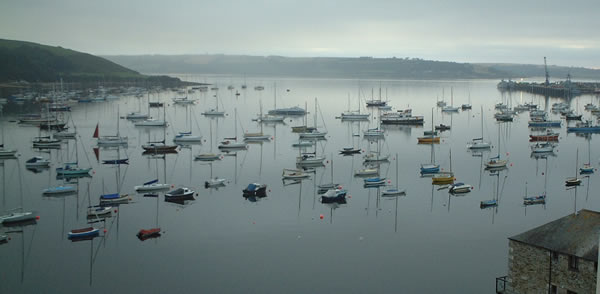
I just got back to Bangor after spending a few days with my family down in Falmouth (Aberfal) in Cornwall (Kernow). My brother has just finished a circumnavigation of the globe in Falmouth four years after setting sail, and we went to welcome him back. His adventures are recounted on his blog.
While in Cornwall I was on the look out for any bits Cornish I could spot. There were plenty of Cornish flags and bumper stickers, some with Kernow on them, some of the leaflets about local attractions have place names in English and Cornish, and the Cornish motto, “One and all / Onan hag oll” appears in both languages on the Cornwall Council logo. One bookshop I visited had a few Cornish language courses and dictionaries, but apart from that, there was very little Cornish to be seen, and none whatsoever to be heard. There may be more Cornish around in other places, but the superficial impression I got was that Cornish is not as visible in Cornwall as Manx is in the Isle of Man.
Every time I see someone mention Cornish now, I always think of the recent “David Mitchell’s Soapbox”:
http://www.channelflip.com/2009/06/25/david-mitchell%E2%80%99s-soapbox-gaelic/
I think that Cornish has a lot further to come back from than Manx but I applaud the revivalists for trying.
Matt, that’s an interesting video. I think David makes some good points. I definitely think that some government funding should be provided for Gaelic, Manx and Cornish, but as for how much I am not sure. As for Gaelic (and other languages), it is now such a small language because of unnatural intervention, i.e. supression by England etc. So I think its revival by unnatural means, i.e. government support, is acceptable.
coool!
is “olll” written with 3 L’s ?
sounds like Kernewek got some weird orthography though!
TJ – it should be oll – olll was typo.
What’s interesting there is the way it is pronounced in Cornish and say a Welsh speaker pronouncing it for example
Onan hag oll in Cornish is pronounced Onan hag ol but in well the ll would denote a Ll sound. but all in well is holl or oll.
So in Welsh it would be
Un ag oll wich is so similar. Yes the languages are similar im just wondering how the Ll sound formed is it a Welsh thing or has it been lost from Cornish and Breton?
Adam – the Welsh ll sound [ɬ] doesn’t appear in Cornish – their ll is an extented or aspirated l sound [l:] / [lʰ], and in Breton the lh is an lj sound [ʎ]. I don’t know if the sound used to feature in either language.
If the Cornish orthographic ‘ll’ is (or can be) aspirated as [lʰ] then it might count as lateral plus voicelessness, just as [ɬ] does in Welsh. Does it alternate with a voiced lateral as the Welsh one does in mutation? It could, of course, be that the phonetics of Cornish doesn’t behave quite like Welsh, at least in part because of Cornish being a revived language. It’s much easier to revive syntax than phonetics: clearly modern Cornish has phonetics but its phonetics might not be related to Welsh phonetics as straightforwardly as its syntax might be related to Welsh syntax.
(Disclaimer: I know a little about Welsh, but next to nothing about Cornish).
Oh right, Yes I know that it’s not pronoucned the same in cornish that was the point I was trying to make, Because i know in IsiZulu the lh is pronounded similar to the ll of Welsh but not exactly therefore is the Ll sound in Welsh uniquely Welsh? Or Did it appear in Cornish and Breton in the past? And yes Ll does mutate for example.
to say from Llanelli to Llandeilo to Llandudno in Welsh would be
O Lanelli i Landeilo i Landudno
Adam – I don’t know if the Welsh ll sound was used in Cornish or Breton in the past, but it is used in other languages: http://en.wikipedia.org/wiki/%C9%AC
Nice picture, maybe more Cornish is Truro?/ I hear that Aberfal/Falmouth has some Cornish classes, but the language does need more exposure at present it seems to be the preserve of academics, and a few locals.
Hi! I was surfing and found your blog post… nice! I love your blog. 🙂 Cheers! Sandra. R.